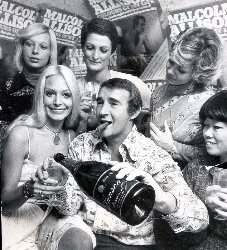The answer to which football side former Smiths front man Morrissey supports is beyond me. He once released a solo album called ‘Your Arsenal’, though being Mancunian born and bred should he hold an interest in Football I would guess it would be either the red or the blue half of his home city. Should Mozza be a Manc Bluenose his possible inspiration for the title of the aforementioned 1989 hit single could well have come from the recently departed icon of their last trophy-laden halcyon era which even the Sheik’s big spending has yet to get near replicating. Though the song itself makes reference to the Kray Brothers, its title could easily refer to the Cockney wide boy who found favour in the 1960s Manchester of Morrissey‘s formative years.
In the swinging 60s, what George Best had been to the footballer Malcolm Allison had been his equivalent on the managerial staff. Brilliantly juxtaposed with former Arsenal captain Joe Mercer as the latter’s apprentice, there wasn’t so much a generation gap between the two men, rather an almighty chasm. Both were old working class and new working class personified, even though only 13 years separated them in age. Mercer was a part of the war generation, his own father was a former Tranmere player who died from complications relating to a gas attack in WW1. Joe himself lost a great chunk of his own career to WW2, where he had served as a sergeant-major. Mercer made 186 appearances for Everton who cruelly discarded him after he picked up a severe cartilage injury, the surgery for which he had to pay for from his own pockets. His career experienced an Indian summer when he signed for Arsenal in 1946, playing on to the age of 40 when he was forced to retire as a result of a broken leg.
He acquired the nickname of the ‘footballing grocer’, a reference to how he supplemented his maximum wage income by running his own store on Merseyside and commuting to Highbury on match days at the club’s expense. Mercer was the archetype of the modest wholesome family-friendly footballer of the inter-war and early post-war period. Malcolm Allison on the other hand was very much riding the new wave in every sense. The son of an electrician born in the new London overspill suburbs of Dartford in 1928, Allison was part of the new affluent working-classes that were to emerge further in the post-war era. He was the symbol of a younger working-class that had had enough of the austerity years and wanted a piece of the good life themselves after several years of waiting. In contrast to Mercer, Big Malc didn’t do modesty. He was often pictured on the end of a big cigar despite losing a lung to Tuberculosis, an illness which cut his career at West Ham short at the age of 29. Around the same time as the Wolfenden Report of the late 50s created a chink in the armour of socially conservative Britain to lay the foundations of the permissive society of the following decade, Allison’s illness gave him the reason to disregard the moral and physical discipline of his playing days and in his own words ‘give myself a reason for being sick’. Not the sort to run a grocery, Allison became a professional gambler in the immediate years following his retirement. After serving his coaching apprenticeship around many non-league footballing outposts, his first managerial job came at Plymouth. This post ended when Allison was sacked for sleeping with a director’s wife, then followed the call from Mercer at Maine Road in 1965.
Recuperating from a stroke the previous year, Mercer’s managerial career had been unspectacular prior to Maine Road. Aided by Allison’s eye for footballing talent and coaching ideas, City had gone from the wilderness of the second tier to winning all three major trophies and victory in Europe by the turn of the decade. As football on the box developed through the late 60s and early 70s, Malcolm’s brash outspoken manner was made for TV. Along with Arsenal left back Bob McNab, Allison was a member of ITV’s ground breaking panel for the 1970 World Cup, the only time the network have ever outdone the Beeb in the ratings. His looks made him the housewives’ favourite, though as seen by the YouTube footage of his exchange with Tottenham’s Alan Mullery many players took exception to his frank views about their performances. In his biography, Frank McLintock explains how he used the TV persona of Allison to his advantage with Charlie George in Arsenal’s 5th Round cup tie at Maine Road on route to the 1971 FA Cup Final.
According to Frank, Charlie had a very black and white approach to making judgments about individuals. To Charlie you were ‘either a diamond geezer or a c***’. In contrast to Bertie Mee, who Charlie famously never hit it off with, McLintock said that ‘Malcolm is exactly the sort of person that Charlie would normally like. He admires talent and brashness but on this occasion I thought it might help us if Charlie thought Allison fell into the other category’. Frank misinformed Charlie that he’d heard through the media that Allison didn’t rate him and thought he was a fancy Dan who couldn’t last the full 90 minutes. Charlie went on to score two goals in the famous fog bound Maine Road encounter in which he introduced the world to his famous lie down celebration. On leaving the pitch he screamed obscenities and gestured to Malcolm in the dug out, to which Frank had to bundle George down the player’s tunnel to prevent repercussions that he hadn’t anticipated. Initially thinking Charlie was some sort of headcase, Frank decided to fill Malcolm in afterwards who had luckily seen the funny side. As Frank stated Malcolm ‘liked to use psychological stunts to get the best out of players and was gracious enough to have a laugh when the tables had been turned on him’.
Though the extravagant Cockney Malcolm shared virtually none of the characteristics of dour Scotsman Gordon Brown, his circumstances bare an uncanny resemblance. Lauded to high heaven when not in the hot seat that he had been widely anticipated to inherit, he became frustrated when the main man reneged on a private agreement to step aside. Also when in the hot seat, like Gordon Brown, he never attained anywhere near the success he achieved as a high profile member of the backroom staff. He dethroned Mercer in a very Machiavellian manner, engineering a boardroom coup in the summer of 1972. His reign only lasted until March of the following year, resigning as City slumped to an underwhelming 11th in the table, after finishing within one point of the title the previous season. To many this had signalled that Mercer’s role in City’s success was to keep the excesses of Allison’s personality in check. Where Mercer went on to benign success after Maine Road, becoming England’s caretaker manager for 7 games, losing only once and playing a role in keeping unfashionable Coventry City as a fixture in the top flight as manager and later director, Malcolm Allison in contrast experienced flamboyant failure at Crystal Palace leading them to two successive relegations.
The high point of his reign at Selhurst came when languishing in the third tier of English football, fedora wearing Allison had inspired the FA Cup run of 1976 which ended in semi final defeat to eventual cup winners Southampton. The mark of the Allison reign had been more an attempted showbiz re-branding of Palace, which in part lead to his infamous downfall. In 1976, porn actress Fiona Richmond visited the Palace training ground and ended up photographed with Allison in the player’s bath. Considering many of the antics of football stars in recent years, the furore surrounding the Fiona Richmond incident seems rather quaint. In an era when everything barring activities with children, animals or the dead is not only legal but frequently viewed by large numbers of the population over the internet, Fiona Richmond’s porn CV consisted of nothing other than naked shots and starring in sub-Carry On movies alongside Robin Askwith. Rather sanguine about the whole episode Allison remarked ‘I often jump into that bath with 20 other blokes and no-one makes any fuss’.
Big Malc also indulged in extra marital affairs with Christine Keeler and two Miss UK winners. His prowess away from football however was countered by growing footballing impotency, also captured for TV in the captivating fly on the wall documentary ‘City - A Club In Crisis’ after his failed return to Maine Road in 1979. Charting his sacking and replacement by former pupil of the West Ham academy, the more low key and inoffensive John Bond, this documentary is fascinating in that it grants access to team talks, discussions between chairman and manager; and board meetings that would be unthinkable in the heavily spin doctored Premier League thirty years on. In a quirk of fate Allison, now back at Palace for an ill fated 55 day spell, had been drawn against John Bond’s City who tonked them 4-0 at Maine Road. It marked the death nail for Malcolm Allison’s dreams of top level success in the English game, the post-match scenes from the Palace dressing room were clearly a wake with Big Malc particularly in mourning for his career. John Bond in the post match press conference also echoed the widely held view that Allison’s genius required a great deal of restraint to function effectively, as he found with Mercer as a figurehead back in the 60s.
For Big Malc the 80s were spent mostly in the wilderness, however he had found success in the Portuguese League, even coaching a certain Jose Mourinho at Vitoria Setubal. The ’Special One’ has since inherited Big Malc’s mantle of self-proclaimed genius with aplomb. In fact despite his detractor’s claims of having the bigheadedness of Cloughie minus the achievements, the ‘School of Allison’ alumni also includes future Barcelona and England manager Terry Venables and England World Cup winning captain Bobby Moore who believed that Malcolm showed more faith in Moore’s abilities during his formative years than anyone else at Upton Park. In a BBC interview from 1992, Malcolm’s enthusiasm for the continental style of technique and nurturing players and despairing of the British techniques of physical conditioning of players sound almost Wengerite, which would explain why his final work in football had been as a part-time scout for Arsenal under Wenger.
Big Malc’s influence can also be seen in today's popular culture according to Simon Briggs in his Telegraph article during last summer’s World Cup. Briggs claimed that modern Football analysis is so tame and insipid that the only heir to the stir caused by the 1970 World Cup Panel on British Television 40 years on can be found on the X-Factor panel (though Simon Cowell with his high trousers would do well to study Big Malc’s dress sense a little closer). Phillip Glenister of Life on Mars and Ashes to Ashes fame also claims that he sought inspiration for the Gene Hunt character from watching vintage clips of Malcolm Allison‘s televisual performances. In short, viewed from the sterile hinterland of the tame popular culture of 21st Century Britain and the PR excesses of the Premiership era we are all the poorer for the passing of football’s original playboy.







